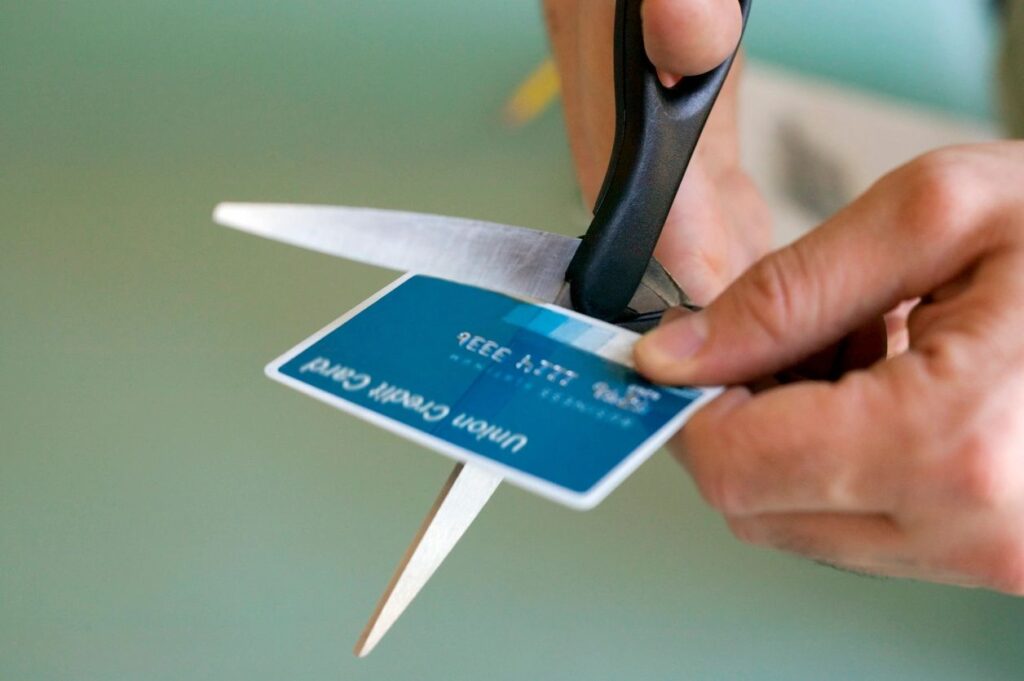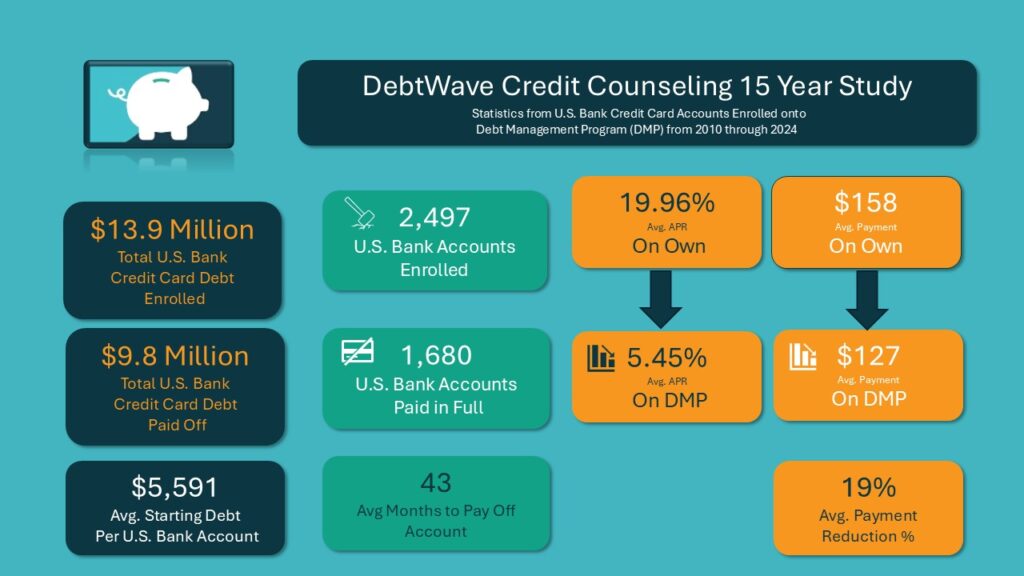
US Bank ranks as the 5th largest bank in the United States based on total assets as of December 2024 per the Federal Reserve. The bank’s history can be traced back to 1891 making it one of the oldest banks still operating.
Although it was last reported in 2021, US Bank stands as the 7th largest bank in terms of total outstanding credit card balance. According to WalletHub.com, US Bank consumers have a total of $40.09 billion of credit card debt. This represents about 4.3% of the total market share.
What are your options to pay back your US Bank credit card debt?
Facing a large amount of credit card debt and/or personal loans can be scary. It’s a constant reminder that we messed up. And chances are neither your formal education nor your parents prepared you on how to handle this situation.
With the average interest rate currently hovering above 24%, paying off this debt on your own presents a great challenge. Especially if you pay only the minimum payments.
However, there are many debt consolidation options to consider when trying to pay back your U.S. Bank credit card debt. The five main options are:
- Debt Consolidation Loan
- 0% Balance Transfer
- U.S. Bank Internal Hardship Program
- Debt Management Plan (Credit Counseling)
- Debt Settlement Plan (Debt Forgiveness)
But the one thing that must be done regardless is putting a stop to overspending. Each time we use a credit card we are likely purchasing something we can’t afford.
Create a detailed budget outlining all income and all expenses. Revisit this budget periodically and make revisions. Increase income. And decrease expenses.

US Bank Credit Card Hardship program
If you find yourself struggling with credit card debt, hardship programs can help. In order to find out if you qualify, contact US Bank directly. Provide as many details as possible about your financial situation. Be prepared to provide them with your monthly income and expenses. Stating that you are simply looking for a lower interest rate and payments probably won’t work. You must have a compelling hardship such as job loss or medical emergency to qualify.
Any concessions granted by US Bank will typically be temporary. A lower interest rate will likely last less than 12 months. Take advantage of that time and attack your debt with extra payments. Some creditors might reduce your credit limit or even close your card once they approve you on their hardship plan.
If you have no luck getting concessions or want more long-term benefits, credit counseling is your next best option. US Bank works incredibly well with these nonprofit organizations. They offer clients interest rates usually below 5%. Payments typically get lowered as well. Your credit card will be closed on their debt management program. This can be viewed as a good thing for some as the temptation to continue using the card is eliminated.
DebtWave has been helping US Bank clients for more than 20 years
DebtWave has worked with various credit card accounts, including US Bank, since 2002 helping clients pay off debt at lower interest rates. Most clients add other credit cards to their plan such as Chase, Synchrony and Citibank accounts. Clients make payments via ACH either monthly, semi-monthly, weekly or biweekly and then DebtWave disburses payments to their creditors. Most clients complete their program and become debt free in less than 5 years. DebtWave has a 68% successful completion rate.
From 2010 to 2024, DebtWave helped clients with a total of 2,497 US Bank accounts. The total debt enrolled onto our program during that time was $13.9 million with an average balance of $5,591 per account. Many clients witnessed their interest rates drop below 6% along with a reduction in monthly payments.
Here are some additional stats from these clients:

The Dream of Getting Out of Debt on Your Own is Still Alive
Paying back your credit card debt seems unrealistic. But it has proven to be achievable by thousands of DebtWave clients. If you would rather tackle the debt on your own, it can be achieved. Create your own plan. The first step is lower interest rates. High interest rates (25-30% APR) on credit cards make it challenging. This would require you to significantly increase your minimum payments (at least 2x) to make progress.
If you succeed in reducing your rates below 10%, then use a payoff calculator or google spreadsheet to create a plan. Find ways to increase income and reduce expenses. Stay motivated and refrain from using cards again. Build an iron clad budget that accounts for all expenses.
Accordions
Most credit card companies like US Bank have internal hardship programs. On a hardship program, banks will temporarily lower your interest rate and sometimes lower your payments. These benefits usually last 3-12 months to help you get back on track. Your financial hardship reason must be compelling to qualify for the benefits. Keep in mind, some creditors may reduce your credit limit or close your account when you are placed on their hardship plan. In summary, hardship programs are like a band aid. They only act as a temporary solution to your debt problem.
Most credit card companies do not have a formal forgiveness or settlement program. In order for a creditor to forgive a portion of your debt, you would need to be severely delinquent. Usually more than 6 months behind where your credit is ruined. At that point, most creditors would be willing to receive a lump payment of 40-60% of the balance and forgive the remaining balance. However, the amount forgiven would typically be considered taxable income by the IRS.
US Bank doesn't have a debt management program. However, US Bank works with nonprofit credit counseling agencies to help their clients experiencing financial hardship. They typically offer their clients lower payments and lower interest rates. Contact DebtWave Credit Counseling at 888-686-4040 for more information. Or Get Help Online.
